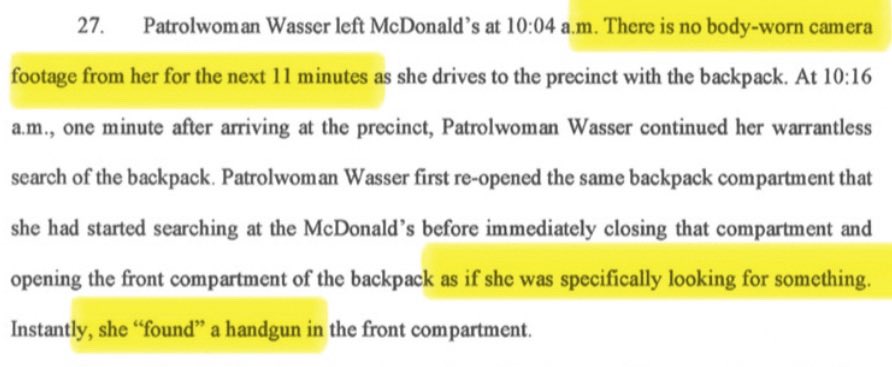Category: A Victory!



We regret to inform you that another female cop may have just botched a case, and not just any case, a major one…
Luigi Mangione, the 26-year-old who’s accused of murdering United Healthcare CEO Brian Thompson, might walk free, not because he’s innocent, but because a female cop allegedly mishandled the search that led to critical evidence being used against him.
According to his lawyers, Mangione’s backpack was illegally searched right after police found him at a McDonald’s in Pennsylvania. Now they’re demanding that everything inside be tossed from the case.
And if a judge agrees, the entire case could fall apart, and one of the most high-profile murder trials in recent memory could blow up over a mistake made by a female officer.
But sadly, this isn’t just about one bad call. It’s about a dangerous pattern driven by DEI hiring, where meeting diversity quotas is more important than choosing the best people for one of the hardest, most stressful jobs on the planet. Just like the military, law enforcement shouldn’t be a social experiment. It’s life and death and more and more Americans are starting to ask the hard question: Are all these diversity-first hires really equipped to handle these high-performance jobs?
Luigi Mangione’s lawyers allege that police illegally searched his backpack after locating him at a McDonald’s in Pennsylvania, and that none of the evidence inside should be allowed at trial, according to a motion filed Thursday evening.
If a judge agrees, it could pose a major hurdle for the Manhattan district attorney’s office, which is prosecuting one of several criminal cases against the 26-year-old, who is accused of killing United Healthcare CEO Brian Thompson in December.
“Law enforcement has methodically and purposefully trampled his constitutional rights,” the filing states, “in violation of the Fifth Amendment and illegally searching his property.”
An X account supporting Luigi’s defense just shared the latest update, clearly hoping it’ll be the break their hero needs to walk free.
BREAKING: Latest motion states patrolwoman searched Luigi’s backpack at McDonald’s without a warrant, then repacked the items and left the restaurant with the backpack, with no body cam footage for the next 11 minutes during her drive to the precinct. Upon arriving at the precinct, she resumed the warrantless search and “found a handgun in the front compartment.”
This latest development has Luigi’s supporters celebrating. They’re convinced the gun was “planted” on him.
omg the police turned off their body cam while looking through luigi mangione's bag, and only after they turned it on, they "found" the gun. so obviously planted lmao. pic.twitter.com/mZLlt9Licl
— Luigi Crave (@525O3511) May 1, 2025
Just like we’ve seen with other gangbangers and violent thugs, Luigi Mangione has become a hero to the Left. They’re already feverishly raising big bucks for his defense.
Donations are pouring in to a fundraiser for Luigi Mangione, the man accused of gunning down a healthcare executive, ahead of his birthday.
Mangione, who pleaded not guilty last month to federal murder charges related to the December 2024 death of UnitedHealthcare CEO Brian Thompson, turns 27 on May 6.
In honor of his birthday, donors are contributing to the GiveSendGo fundraiser for his legal defense, which is now closing in on $1 million.
As of Sunday evening, the fundraiser had garnered more than $977,000. His legal team has said that he plans to use the cash toward his defense in all three cases he faces.
The Ivy League graduate has been charged in federal and New York state courts with murder and other crimes; he has pleaded not guilty to all counts in both venues. He also faces criminal charges in Pennsylvania, where he was captured by authorities in a McDonald’s following a six-day manhunt; he has yet to make a plea in the state.
A string of supporters in the past few days have donated $27 to the fund for his 27th birthday. In their donation messages, many included green hearts, an ode to the green-clad Mario video game character Luigi.
This kind of situation has been happening more and more, and it’s starting to look like a very disturbing pattern.
If you’re pulled over by a lady cop, it’s time to hunker down and crank up those survival instincts—because odds are, you’re about to become the victim of a “whoopsie” moment.
We see it all the time: female cops, unable to handle the stress and danger of the job, buckling under pressure and either losing total control of the situation or accidentally discharging their weapon.
Who hasn’t seen a clip where a female officer gets the tables turned on her and ends up taken down by the perp? Most of the time, these situations escalate to the point where male bystanders have to step in and save the day. It’s dangerous for everyone involved and puts the public at serious risk.
[…]
A black man was pulled over by cops, and he told them he was carrying a holstered gun. But while the female officer was retrieving the gun, she somehow managed to shoot him.
Put this one in the female cop hall of fame. pic.twitter.com/M7CTyjwzmX
— Dissident Soaps (@DissidentSoaps) January 22, 2025
Once again, we’re staring down the fallout of a botched case, this time, thanks to a female cop who may have handed the Left’s latest “hero” a get-out-of-jail-free card.
 NRA-ILA
NRA-ILA
Last week, the Kansas Supreme Court upheld a significant district court dismissal in Johnson v. Bass Pro Outdoor World, LLC, deciding that Bass Pro Outdoor World and Beretta USA/Beretta Italy cannot be sued by a man who was accidentally shot.
The court cited the Protection of Lawful Commerce in Arms Act (PLCAA), a federal law that protects firearm manufacturers and dealers when products are misused in a crime and concluded neither can be held responsible for the incident.
In an unfortunate set of events in 2018, a former college football player purchased a Beretta handgun from a Kansas Bass Pro Shops location.
According to court documents, while attempting to disassemble the firearm to show it to a teammate, he mistakenly believed the firearm was clear and would not fire if the magazine was removed.
In further error, he also believed that the trigger had to be pulled before disassembly. These detrimental and erroneous assumptions subsequently led to his teammate, seated next to him, being shot in the leg, resulting in an injury requiring amputation.
The injured teammate subsequently filed a product liability lawsuit claiming the handgun lacked essential safety features that would have prevented a discharge and that both Beretta and Bass Pro Shops ultimately bore responsibility.
The lawsuit also pointed to the man’s lack of knowledge on the firearm’s operation despite various directions and signed paperwork directing the purchaser to further training and education, as well as the Beretta’s frame being stamped with the message, “FIRES WITHOUT MAGAZINE.”
When the case reached the Kansas Supreme Court on appeal, the justices unanimously agreed with the district court that Bass Pro and Beretta are immune from the lawsuit because of the PLCAA’s protections. The analysis hinged on whether the lawsuit is considered a qualified civil liability action, per 15 U.S.C. § 7903(5)(A)(v). A qualified civil liability action is any civil action seeking damages resulting from criminal or unlawful use of a firearm. PLCAA bars product liability actions if the firearm discharge was caused by a volitional act and the shooting constituted a crime.
The court held that the PLCAA does, in fact, provide immunity for the firearm sellers and manufacturer in this case due to the commission of a volitional act, as well as this shooting constituting a crime. Even though there was no intention to fire the gun, the man deliberately pulled the trigger, a volitional act. Further, because he did so while stopped at a traffic light, it violated a Kansas strict liability law against discharging a gun on a public road, making it a criminal act, the ruling said.
The Protection of Lawful Commerce in Arms Act, signed into law by President Bush in 2005, continues to serve a critical role in reinforcing the well-established legal principle that companies lawfully conducting business cannot be held responsible for crimes they didn’t commit. Unfortunately, anti-gun activists continue to pursue lawsuits meant to sue the firearm industry into oblivion or to force “settlements” that include judicially imposed gun control.
NRA-ILA regularly reports on these abuses, for example, here, here, and here. We also remain committed to the important work of reinforcing the PLCAA at the federal and state levels, as well as advocating to ensure the law’s intent is upheld by the courts.
Beginning with the dubious decision in Soto v. Bushmaster, which provided the backdrop to Remington Arms’ bankruptcy, gun control activists have renewed their efforts to infringe all Americans’ Second Amendment rights by targeting the industries that serve them.
It is therefore especially encouraging to see the Kansas Supreme Court embrace the commonsense notion, embodied in the PLCAA, that responsibility for Johnson’s lamentable injuries lies not with the companies that lawfully imported and sold the gun but with the man who intentionally pulled the gun’s trigger while the muzzle was pointed at Johnson.
